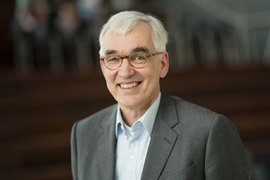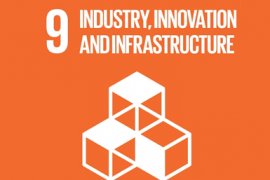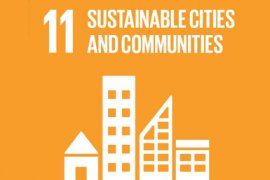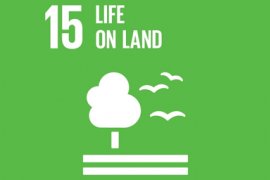Sustainable Energy

At the Copernicus Institute, we work from the understanding that the energy transition is at its core technical, but that implementation also requires a broad understanding of environmental, economic and societal factors.
The defining strength of our sustainable energy research is that collectively our expertise gives full coverage of the energy system, old and new, production and use. Our academic interest is driven by the desire of the researcher to help society address the energy challenge. Consequently, our research profile is always adapting to tackle the most critical issues and knowledge gaps in the energy domain, and we are increasingly incorporating the social sciences into our program.
Highlights

Towards zero greenhouse gas emissions: energy efficiency and demand reduction key
How can we reach zero greenhouse gas emissions by 2050? According to Professor Ernst Worrell, a completely sustainable energy supply is a major challenge.

Solving the solar panel shading problem
In this interview Sara Mirbagheri Golroodbari tells us about her research finding solutions for the solar panel shading problem, as well as the tests for floating solar panels taking place on campus.

"We need carbon-based energy, but make it circular and taxed"
With an increasing global population and the industrialisation of the Global South we will need more and more energy to sustain the global economy. Professor Gert Jan Kramer argues that the flow of carbon must become circular and taxed.

Cleaning solar panels in dry weather can offer significant benefits
Most installation companies claim solar panels are maintenance-free. However, for long periods of dry weather cleaning may be beneficial. A lack of rainfall leaves panels covered in dust and less able to absorb sunlight.

Biomass certification will make biofuels a viable part of the energy transition
How can the world transition away from a fossil-based economy? Utrecht University Professor Martin Junginger is certain that biofuels must be part of the equation: not everything can be powered by intermittent green renewables, and the 2050 deadline is just around the corner.

Roadmap for solar power systems in the Netherlands
The Netherlands Enterprise Agency (RVO) commissioned a study that resulted in a new Roadmap for solar power systems and applications in the Netherlands.

Providing communities with tools to reduce energy consumption in their homes
Utrecht University researchers Tarek Alskaif and Wilfried van Sark aim to provide communities with technology and support to help reduce energy consumption in their homes, and is running a pilot in East Amsterdam.

How bioenergy production impacts biodiversity in the USA
The increased demand in biofuels will change how land in the southeast of the United States is being used and managed. This has a major effect on the regional biodiversity. Researchers quantified these land use changes and their effects on the regional biodiversity.

Sustainable Industry Lab
Sustainable Industry Lab is a national initiative co-founded by Copernicus' Dr. Sanne Akerboom and Prof. Gert Jan Kramer, bringing together academia, industry, government and societal partners, to together explore directions and consequences associated with transforming industry in the Netherlands to more sustainable practices.

Smart Solar Charging
Due to the strong growth of decentralized sustainable electricity generation, gas-free areas and electric transport, the electricity system in the Netherlands is facing unique challenges. At a local (district/city) scale this may lead to increasing congestion problems in urban regions. Networks of smart and bi-directional charging cars, stationary batteries and other decentralised sources offer a fast-growing flexibility potential that can grow into an integrated, city-wide flexibility system.

Algorithmic Computing and Data-mining for Climate integrated Energy System Models ( ACDC-ESM)
The large-scale use of renewable energy poses new challenges, due to daily and yearly fluctuations in the weather. Energy network operators use computer models to help them select the best combination of financial and practical measures to tackle these challenges. The goal of this study is to improve these models.
Biofuel production can be more efficient in combination with hydrogen
By combining ethanol production from sugar cane with hydrogen, the CO2 released during ethanol production could be converted into methanol, according to a study analysing the production of biofuels from sugar cane in Brazil. In these times of energy scarcity, this way of producing biofuel could offer a hopeful alternative.

Broad NWA consortium to investigate nature-positive potential of floating solar panels
The consortium aims to establish the technological, ecological and social conditions under which floating solar energy has a sustainable future for people and nature in different landscapes.
Major step forward for scale-up of lignin based bio-asphalt
The construction of test strips in the Netherlands aims to provide the necessary knowledge to roll out "bioasphalt" at a large scale, allowing road construction to become greener, the storage of biogenic carbon in roads, and contributing to reducing dependence on oil.

Accelerating Net Zero: A call for a global monitoring system for solar energy
Copernicus solar energy expert Prof. Wilfried van Sark proposes and outlines the establishment of a comprehensive monitoring system that would ensure a reliable and sustainable electricity supply, helping unleash the full potential of PV solar in reaching Net Zero emissions by 2050.

The future of bioenergy in Europe
Connecting the past 20 years with the coming decades, in this 2021 European Energy Innovation Magazine article, Prof. Martin Junginger ponders the future of bioenergy. In short, it's here to stay.











